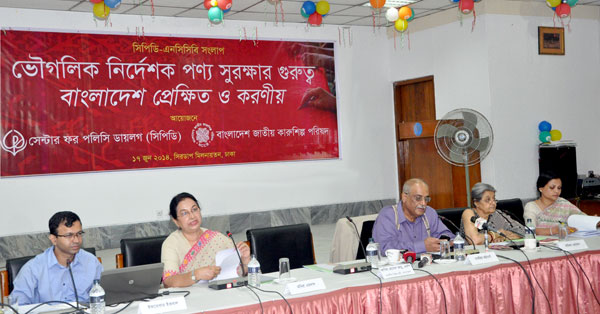The government should operationalise the draft Geographical Indication Act without any further delay to claim the authenticity of Jamdani as a Bangladeshi heritage product with Geographical Indication (GI).
Lapses in the recently enacted Geographical Indicative Products (Registration and Protection) Act 2013 must also be identified so that Bangladesh could settle parallel enlisting of same products with countries such as India, which already has taken the advantage of its GI Act to entitle Uppada Jamdani sarees as an authentic Indian product.

The observations emerged from a Dialogue on “Protecting Geographical Indication Products in the Context of Bangladesh and the Way Forward” (ভৌগলিক নির্দেশক পণ্য সুরক্ষার গুরুত্ব: বাংলাদেশ প্রেক্ষিত ও করণীয়, organised by CPD and National Crafts Council of Bangladesh (NCCB) at the CIRDAP auditorium on Tuesday 17 June 2014.

CPD Distinguished Fellow Dr Debapriya Bhattacharya, also Chair of the event, stressed that promulgation of the recently enacted GI Act would ensure that the trade profit arriving from GI products is reaching the local weavers and producers.
Dr Iftekhar Iqbal, Associate Professor of History, University of Dhaka presented a research report on his field-level study “Protection of Jamdani as a Geographical Indication in Bangladesh.” Research revealed that academic references on social and cultural contexts, trading documents, historical events and oral testimonies from weavers fully support the authenticity of Jamdani as a Dhaka-based “surviving variety of the world renowned muslin from ancient period.”
“Jamdani should be named as Jamdani, not Dhakai Jamdani, as one of the foremost GI products when the enlisting begins in Bangladesh” argued Dr Iqbal in his presentation.
Dr Iqbal informed that the traditional art of weaving Jamdani muslin in Bangladesh was included in UNESCO’s list of the “Masterpieces of the Oral and Intangible Heritage of Humanity” in 2013. He also cited that export earnings from total export of Jamdani between 2010-11 was valued at US$ 10.41 million, which doubled from the export value of US$ 4.84 million in 2008-09.
Designated Discussant Barrister Shukla Sarwat Siraj, Bangladesh Supreme Court underscored that the government should make the Bangladesh GI Act competent to protect authentic products and pave support for dispute settlements in this regard in the international context. She mentioned that India could have taken an initiative for a reciprocal arrangement with Bangladesh to settle conventions on Jamdani between the two countries.
Eminent fashion designers and boutique owners Ms Bibi Russell, Founder of Bibi Production and Mr Shahid Hussain Shamim, CEO of Prabartana Ltd and also General Secretary of NCCB, voiced concerns on protecting the local Jamdani weavers and their unique craft and raising awareness about counterfeit Jamdani variations.
Dr Hameeda Hossain, Former Chairperson, Ain O Salish Kendro (ASK); Ms Khushi Kabir, Member, CPD Board of Trustees; Mr Selim Ahmed Chowdhury, Examiner (GI and WTO) Department of Department of Patents, Designs and Trademarks; Mr S M Nurul Alam, Director, WTO Cell, Ministry of Commerce; Ms Shanchita Haque, Director, Economic Affairs Wing, Ministry of Foreign Affairs; Mr Suhel Ahmed Choudhury, Former Commerce Secretary; Ms Monira Emdad, Executive Member, NCCB; Ms Ruby Ghuznavi, Vice President, NCCB; Dr Mohammad Abu Yusuf, Senior Research Fellow, Bangladesh Foreign Trade Institute (BFTI); Ms Mahua Zahur, Lecturer of Law, BRAC University; Ms Maleka Khan, Executive Member, NCCB; Mr Saiful Islam, CEO, Drik addressed the floor discussion among others.


